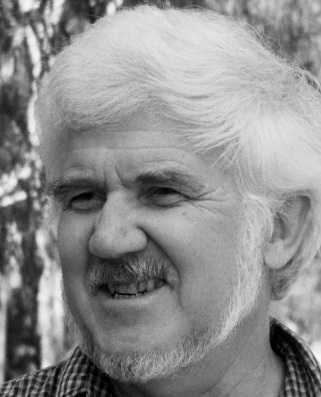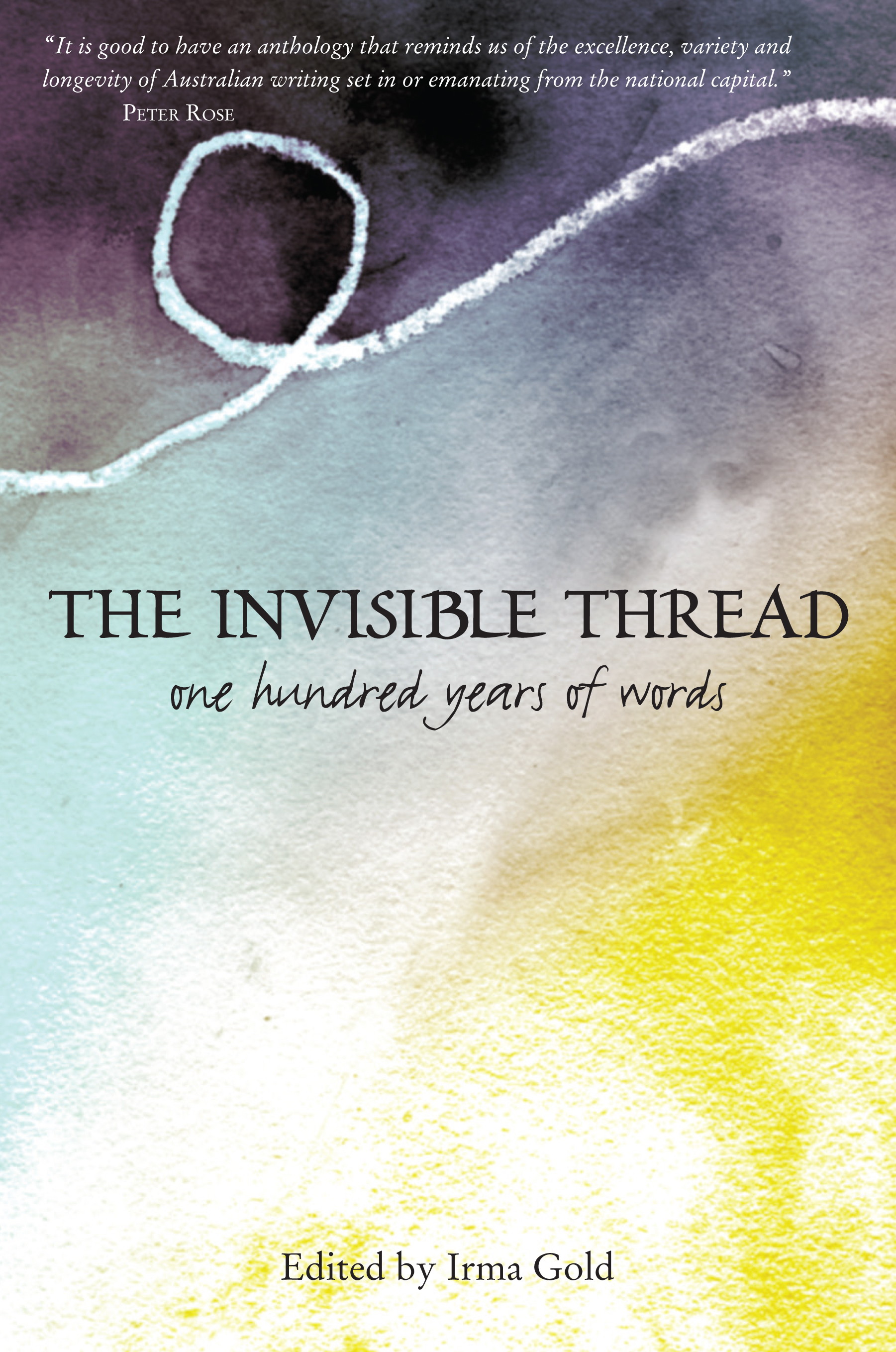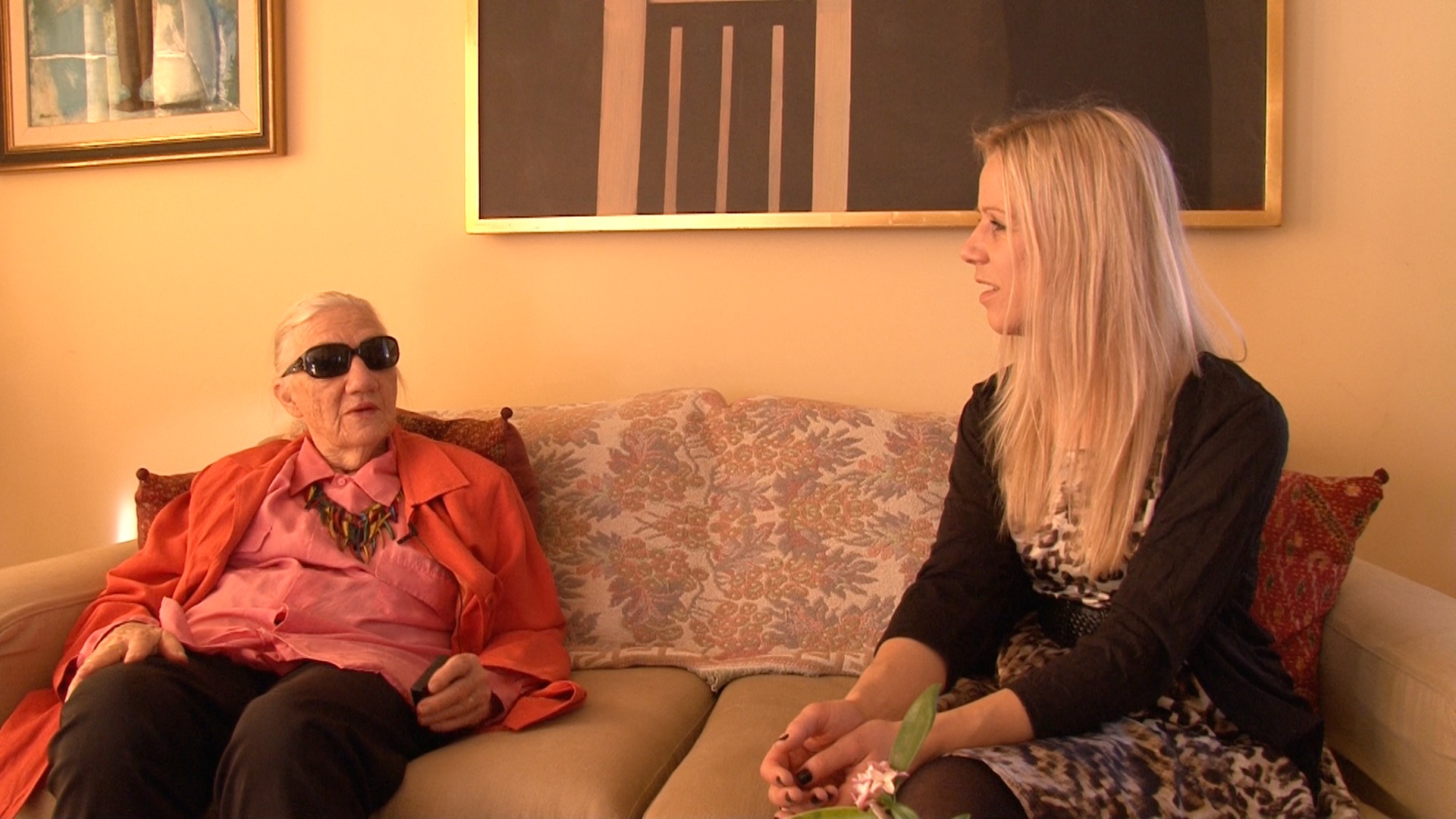Parang
A quick heads up to let you know that next Wednesday I’ll be launching poet and rapper Omar Musa’s latest collection, Parang. I first saw… Read More »Parang
A quick heads up to let you know that next Wednesday I’ll be launching poet and rapper Omar Musa’s latest collection, Parang. I first saw… Read More »Parang
 Geoff Page is one of Canberra’s best known and most loved poets. He’s lived in this part of the world for almost 50 years which means he’s got a story or two to tell about the region’s literary goings-on. He is one of 75 writers included in an anthology that I recently edited, The Invisible Thread, and he’s appearing at a forthcoming evening of Thread readings, which all seemed like a good enough excuse to ask him a few questions. His responses were rich and insightful and I particularly enjoyed his recollections of time spent with Australia’s late great poets.
Geoff Page is one of Canberra’s best known and most loved poets. He’s lived in this part of the world for almost 50 years which means he’s got a story or two to tell about the region’s literary goings-on. He is one of 75 writers included in an anthology that I recently edited, The Invisible Thread, and he’s appearing at a forthcoming evening of Thread readings, which all seemed like a good enough excuse to ask him a few questions. His responses were rich and insightful and I particularly enjoyed his recollections of time spent with Australia’s late great poets.
Irma Gold: Geoff, over the course of your career you’ve published a very significant body of work. What is it that drives you?
Geoff Page: Mainly the enjoyment of doing it — though there can be painful stretches when things aren’t going well. Initially, writing requires self-discipline but quite soon it becomes an obsession. After that it’s a matter of quality-control.
IG: I was speaking to Alan Gould recently about Canberra’s vibrant poetry scene in the 1970s when you were both putting on readings with writers like Alec Hope, Bob Brissenden, David Campbell, David Brooks and Rosemary Dobson. What stands out most for you about that time?
GP: It was a halcyon period in many ways — and certainly essential to my development as a poet. To meet the standard set by Alec Hope, David Campbell, Bob Brissenden and Rosemary Dobson was no small consideration. David Brooks was in the younger generation, along with Alan Gould, Kevin Hart, Mark O’Connor, Philip Mead, et al. They also had the effect of driving me forward. One way or another, the latter group ran the ANU Poetry Society, produced a nationally-distributed magazine called Canberra Poetry and issued quality broadsheets from the Open Door Press. In age, I was conveniently between the two groups and both were an incentive for me to keep writing and become more serious about my art.
Read More »Spitting out poems: an interview with Geoff Page
To be a Canberra poet in those days (as opposed to a Sydney or Melbourne one) marked you, to some extent, as an aesthetic conservative but I had no trouble making connections with other differently-inclined poets in Sydney and, to a lesser extent, in Melbourne. Back before he published his first book in 1965, Les Murray had worked at the ANU as a translator and his influence was (perhaps coincidentally) strongly felt by most, if not all, of the younger generation of Canberra poets. These, too, were the years of the Australian ‘Poetry Wars’ in which, like Switzerland, I tried, in my reviewing and other activities, to remain neutral—although my own poetry did, I concede, suggest a loyalty to one side rather than the other.
IG: What was your experience of the ‘elder’ poets?
GP: Alec [Hope] was the first of them to read any of my work, well before I published a single poem. A small selection was sent to him via a mutual friend and Alec replied generously saying something to the effect that ‘this poet may have something; he seems to spit the poems out of the side of his mouth’. I took that as a favourable reference to what I considered my ‘minimalism’. It was perhaps even more generous when one considered Alec’s notorious essay on ‘free verse’ — which he condemned absolutely while being more than kind to its practitioners. Perhaps, even then, he noticed my verse was less ‘free’ than I thought.
David Campbell was another who took young poets seriously. I can remember his showing me a few of his as yet unfinished poems and seeking my opinion, not the action of most poets 25 years one’s senior. David was also a considerable lunch companion and inviter of poets to lunch at his small station called ‘Folly’s Run’ (where he would say: ‘Come about ten and we can do some work on the yards first.’)
Judith Wright I came to know better towards the end of her life when she was living in a flat in Lyons. I recall her launching a book for me in 1980 and having the distinct feeling that she had accepted me by then as the ‘genuine article’ — not someone who was merely dabbling at the edges of the art. Rosemary Dobson, who died only last June, was comparably inspirational though in a rather different way. Unlike Judith, Rosemary was not political and perhaps rather like the Argentinian writer, Jorge Luis Borges, had a more transcendent approach, as well as a more familial and domestic one. Her very presence at the readings I ran from 1994 in successive Canberra cafés (now Poetry at the Gods) was, in itself, encouraging — not only to local poets but to those who came from Sydney, Melbourne and elsewhere. Hers was a quiet presence but an indispensable one.
Other poets of that time, who are perhaps undeservedly less well-known, include RF (Bob) Brissenden and the diplomat JR Rowland — one rather wilder than the other but both encouraging by their sustained presence on the scene. Bob, in particular, was famous for his parties (the like of which are rare these days, I’m afraid). Bob, like Alec Hope, was deeply learned and reminded us that the twentieth was not the only century with any merit. The age of Doctor Johnson was also of interest.
IG: How has Canberra’s poetry scene changed since then?
GP: That’s a long story — suffice to say that the ‘scene’ now is more diverse, with performance and slam poetry playing a role, too. ‘Literary’ poetry, on the ‘page’ rather than ‘stage’, is my preferred genre — even though I think the ‘oral’ dimension of poetry is crucial. It’s interesting that we now have more than 20 ‘literary’ poets in Canberra (and surrounding regions) with some sort of national profile. It can make it hard to fit them all in every second year or so at the Gods readings. I organise — which, of course, have many poets from all around the country (and even overseas, on occasion) as well.
IG: Your poem ‘My Mother’s God’ is included in The Invisible Thread. Can you tell us about what sparked it, and what it means to you?
GP: It came from arguments I used to have with my mother when I was about 19. I was a member of the Student Christian Movement at the time but have long since been an agnostic. My mother recognised the poem as one of my best but she still felt embarrassed by it (probably because it was too ‘close to the bone’). I suspect it’s a definitive version of what I call ‘secular protestantism’, a tendency which I have not altogether escaped myself.
IG: Religion is one of the major themes of your work, what keeps bringing you back to this theme?
GP: Religion is not ‘going away’ as rapidly as atheists would wish. It’s a potent force in the world (quite often for ill). We need to understand it (in its many different dimensions) and recognise its long role in our intellectual history. Most of our current secular values originate in Christianity (particularly Lutheran protestantism) but it’s more than fortunate the eighteenth century enlightenment came along too as an ‘antidote’ to its excesses. I don’t really like certainty in any form, religious or secular, but metaphysical questions continue to intrigue me. My partner, Alison, (who grew up in a manse) assures me I have written too many religious poems and she’s probably right.
IG: What book has had the most significant impact on you?
GP: That’s hard to say; there are so many. I’d certainly mention William Carlos Williams’ Selected Poems and Judith Wright’s The Moving Image as two crucial ones in my formative years.
IG: What books are currently on your bedside table?
GP: It’s a big, unread pile threatening to ‘brain’ me in the night. At the moment I’m reading Patrick White’s first novel, Happy Valley. I would like to read more fiction and philosophy than I do. Of course, I read a lot of contemporary Australian poetry as a reviewer and a certain amount of history and nonfiction as ‘research’ for my poems.
IG: What are your literary plans for 2013?
GP: My New Selected Poems (Puncher & Wattman) is due out in October and my ‘horizontal narrative’ in verse, 1953, (UQP) will be launched at the National Library Bookshop in April. At the moment, I’m working on individual poems rather than any longer project.
Geoff Page will be reading his Invisible Thread poem at an evening of readings on 14 March, 6 pm at Paperchain Bookstore. Other readers will include Bill Gammage, Marion Halligan, Susan Hampton, Suzanne Edgar and Julian Davies.
This week I’ve disappeared into the world of my much-neglected novel. I’ve been tightening, ruthlessly cutting, and thoroughly enjoying myself. But I’m emerging briefly to… Read More »The Invisible Thread series: Steve Kelen
We’ve finally reached the end of our video interview series but we’re going out with a bang. When I spoke to Dorothy Johnston on the shores of Lake Burley Griffin she was feisty, outspoken and honest. We talked about everything from the importance of having the ‘right’ length of jeans and going to the ‘right’ bars in literary Melbourne, to hitchhiking from Sydney to Canberra during the time of Ivan Milat, how her writing set in Canberra is a way of saying ‘up you’, and why the Seven Writers’ iconic status is ‘a false view’.
Dorothy was one of three founding members of Seven Writers (I also spoke to fellow member Marion Halligan recently and that interview can be found here). I’m always fascinated by writers’ groups, particularly the ones that work, because so many don’t. The idea of a regular gathering of like-minded colleagues who are mutually supportive and constructive in their criticism is so attractive. Yet most groups seem to falter for one reason or another. The longevity of Seven Writers is a mark of its success—for 18 years these women shared their lives and their work.
During our interview Dorothy related a story about a celebration Seven Writers held when the collective number of their published books exceeded the combined total of their children and grandchildren. As a mother of three, this intertwining of books and children is greatly appealing. All seven of them were mothering and writing and carving out their own paths, separately yet together.
Read More »The Invisible Thread series: Dorothy Johnston
Given their success, it’s little wonder that Seven Writers is held up as an ideal, but Dorothy asserts this as ‘a false view’. She says: ‘It took us ages to get off the ground as a writers’ group and we weren’t at all well-known…For ages it didn’t seem as if we would survive at all. So that business of the kind of iconic status is not something that we have ever fostered or sought.’ And yet she acknowledges the immense value of the group. ‘You knew you would get honest responses about a piece of writing. That you could take anything to them. You could take ideas to them or some scrappy first draft, and people would pay attention. That’s immeasurably hard to find.’
 ‘The Boatman of Lake Burley Griffin’, included in The Invisible Thread, is a story that came out of that time and marks the beginning of Dorothy’s emotional connection with Canberra. It arose from the traumatic experience of her 11-month-old baby contracting salmonella poisoning. For days he lay in the Canberra Hospital, situated beside the lake, hovering between life and death. Dorothy found herself in a state of suspension. Unable to go home, she spent time looking out over the lake. Like many of us, Dorothy moved to Canberra reluctantly, but when her son survived she says ‘it became the place of my heart’.
‘The Boatman of Lake Burley Griffin’, included in The Invisible Thread, is a story that came out of that time and marks the beginning of Dorothy’s emotional connection with Canberra. It arose from the traumatic experience of her 11-month-old baby contracting salmonella poisoning. For days he lay in the Canberra Hospital, situated beside the lake, hovering between life and death. Dorothy found herself in a state of suspension. Unable to go home, she spent time looking out over the lake. Like many of us, Dorothy moved to Canberra reluctantly, but when her son survived she says ‘it became the place of my heart’.
The Canberra Hospital no longer exists. It was imploded in a public event with much fanfare that ended, appallingly, in the death of a child. For our interview Dorothy and I meet at this significant site, so bound up in memories and meaning. It is a blustery day and the leaves on the silver barks flip their smooth ivory backs at us. As we talk about the mythical boatman of her story I half expect him to glide into view. To say to us, ‘I’m taking you where you want to go. You’ll recognise it when we get there.’ He doesn’t show, but later a couple of kayaks paddle silently into the camera frame. It’s as close as we’re going to get.
I hope you’ve enjoyed watching these interviews as much as I’ve enjoyed making them. And a big thank you to Dylan Jones, cameraman and editor for all 19 videos. You can catch up on any you’ve missed here, but first click on the triangle below and spend a few minutes with Dorothy.
https://www.youtube.com/watch?v=ArdnY-aUNXI
The sun is out, it’s school holidays, and I’ve slowed down a little, which is to say that I’ve neglected these posts. But I’m back today with Barbara Blackman.
I interviewed Barbara in winter, heavy with a flu I couldn’t shift. At her home, I traipsed upstairs and down with Dylan, the camera man, looking for a spot to film. The light in her house was peach-coloured and the walls were full of art. It had the feel of a gallery. For 30 years Barbara was married to painter Charles Blackman, one of Australia’s finest artists, and spotting one of his Alice and Wonderland series hanging above a side table I felt a small thrill.
 In the end we settled on a couch downstairs where Barbara often sits to listen to music. Indeed in our interview she spoke about the importance of music in her life and why she has been dubbed ‘the patron saint of audiences’. Her role as a philanthropist is well known and last year she was made an Officer of the Order of Australia in recognition of her support for the arts.
In the end we settled on a couch downstairs where Barbara often sits to listen to music. Indeed in our interview she spoke about the importance of music in her life and why she has been dubbed ‘the patron saint of audiences’. Her role as a philanthropist is well known and last year she was made an Officer of the Order of Australia in recognition of her support for the arts.
Read More »The Invisible Thread series: Barbara Blackman
Among other things, we also spoke about her 50-year friendship with poet Judith Wright and their first meeting at a life-altering lecture by Judith’s partner, Jack McKinney. ‘I was greatly moved by both these people,’ she told me. ‘Although I was 15, a schoolgirl, and Judith was 30 and a published author, we somehow clicked. We got on very well and she big-sistered me through a lot of life’s narrow passageways.’
https://www.youtube.com/watch?v=QO2d13VEAuk